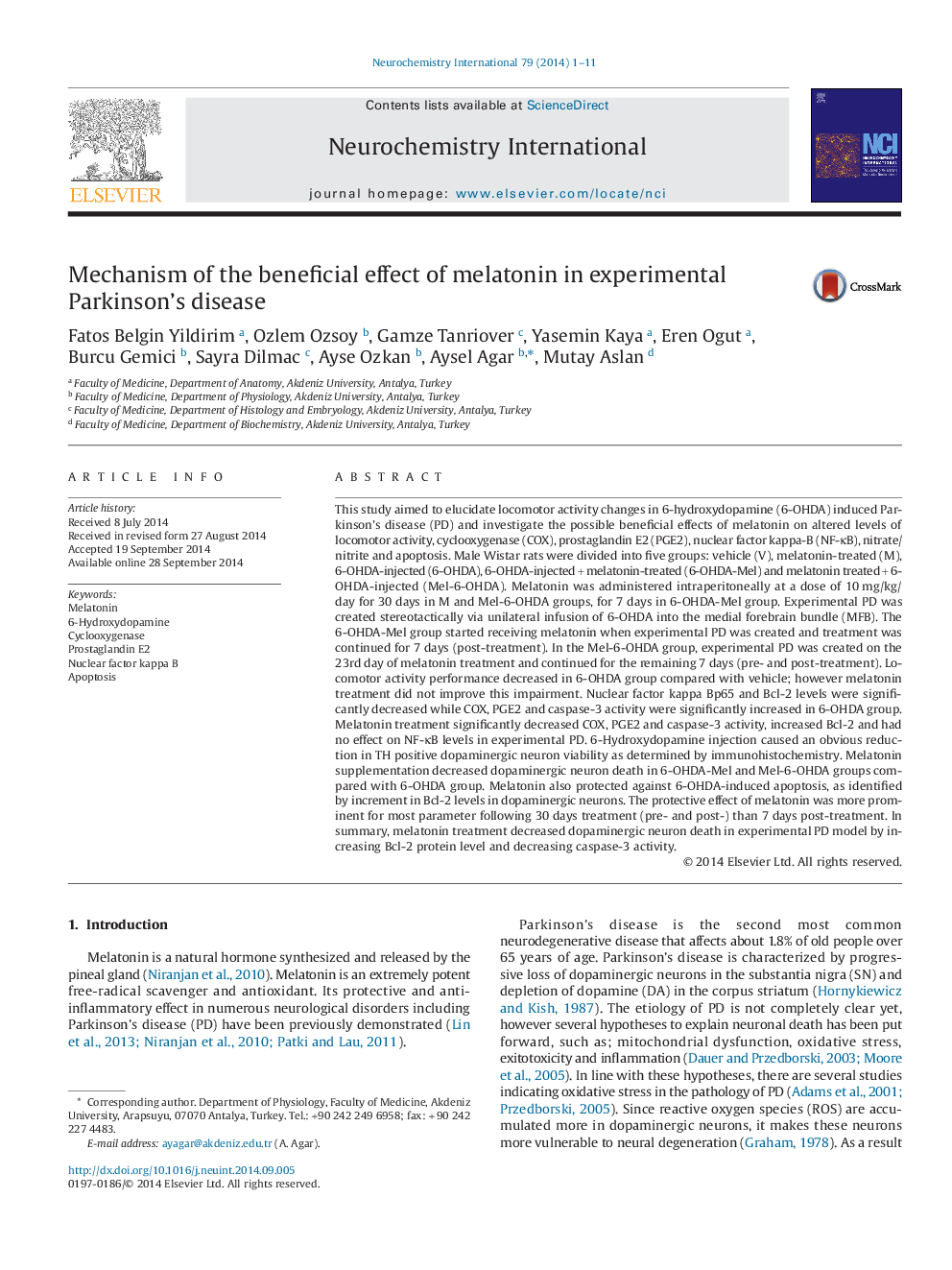| کد مقاله | کد نشریه | سال انتشار | مقاله انگلیسی | نسخه تمام متن |
|---|---|---|---|---|
| 2200474 | 1551294 | 2014 | 11 صفحه PDF | دانلود رایگان |
• Melatonin treatment decreased COX activity which was increased with 6-OHDA.
• Melatonin treatment decreased PGE2 level which was increased with 6-OHDA.
• Melatonin treatment decreased caspase-3 activity which was increased with 6-OHDA.
• Melatonin treatment decreased neuron death which was increased with 6-OHDA.
• Melatonin treatment increased Bcl-2 amount which was decreased with 6-OHDA.
This study aimed to elucidate locomotor activity changes in 6-hydroxydopamine (6-OHDA) induced Parkinson's disease (PD) and investigate the possible beneficial effects of melatonin on altered levels of locomotor activity, cyclooxygenase (COX), prostaglandin E2 (PGE2), nuclear factor kappa-B (NF-κB), nitrate/nitrite and apoptosis. Male Wistar rats were divided into five groups: vehicle (V), melatonin-treated (M), 6-OHDA-injected (6-OHDA), 6-OHDA-injected + melatonin-treated (6-OHDA-Mel) and melatonin treated + 6-OHDA-injected (Mel-6-OHDA). Melatonin was administered intraperitoneally at a dose of 10 mg/kg/day for 30 days in M and Mel-6-OHDA groups, for 7 days in 6-OHDA-Mel group. Experimental PD was created stereotactically via unilateral infusion of 6-OHDA into the medial forebrain bundle (MFB). The 6-OHDA-Mel group started receiving melatonin when experimental PD was created and treatment was continued for 7 days (post-treatment). In the Mel-6-OHDA group, experimental PD was created on the 23rd day of melatonin treatment and continued for the remaining 7 days (pre- and post-treatment). Locomotor activity performance decreased in 6-OHDA group compared with vehicle; however melatonin treatment did not improve this impairment. Nuclear factor kappa Bp65 and Bcl-2 levels were significantly decreased while COX, PGE2 and caspase-3 activity were significantly increased in 6-OHDA group. Melatonin treatment significantly decreased COX, PGE2 and caspase-3 activity, increased Bcl-2 and had no effect on NF-κB levels in experimental PD. 6-Hydroxydopamine injection caused an obvious reduction in TH positive dopaminergic neuron viability as determined by immunohistochemistry. Melatonin supplementation decreased dopaminergic neuron death in 6-OHDA-Mel and Mel-6-OHDA groups compared with 6-OHDA group. Melatonin also protected against 6-OHDA-induced apoptosis, as identified by increment in Bcl-2 levels in dopaminergic neurons. The protective effect of melatonin was more prominent for most parameter following 30 days treatment (pre- and post-) than 7 days post-treatment. In summary, melatonin treatment decreased dopaminergic neuron death in experimental PD model by increasing Bcl-2 protein level and decreasing caspase-3 activity.
Journal: Neurochemistry International - Volume 79, December 2014, Pages 1–11
